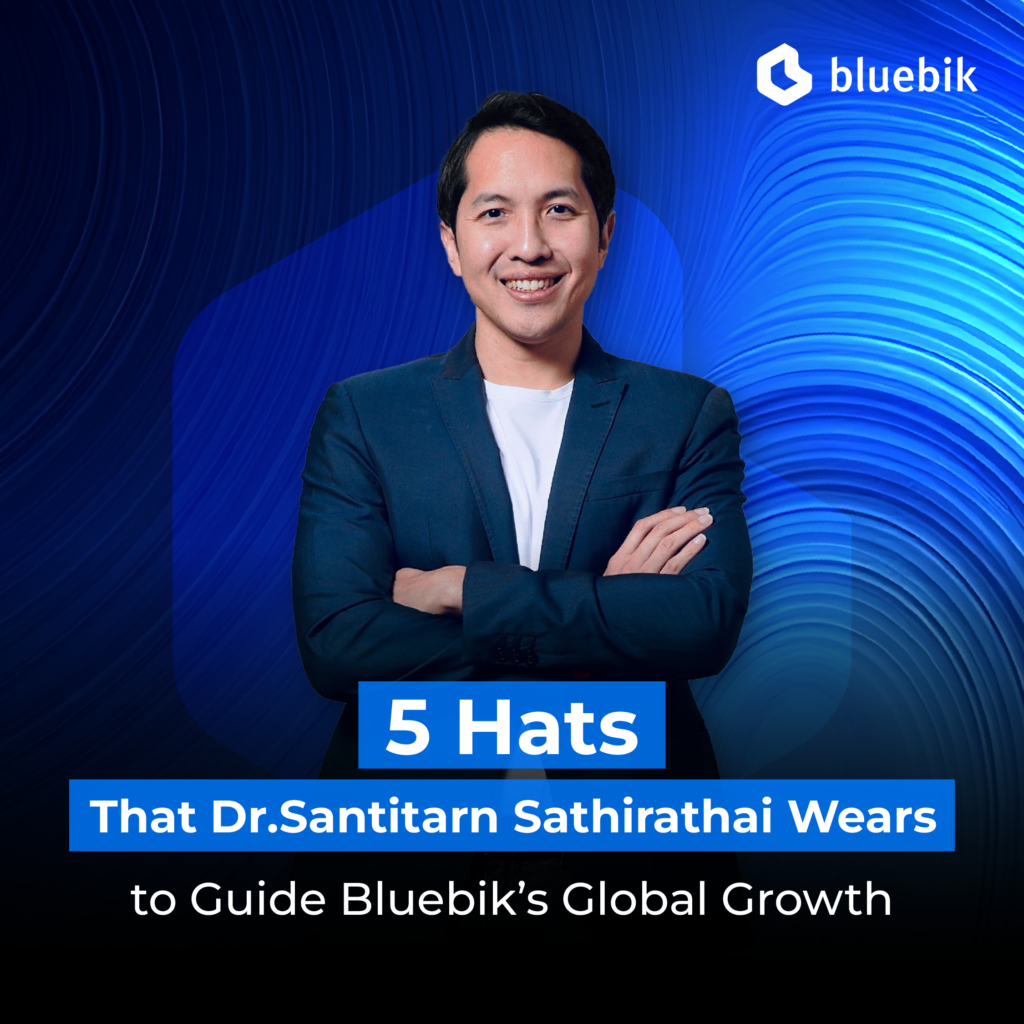Dr. Santitarn Sathirathai, also known as Dr. Tonson, needs little introduction.
This is because his carefully curated career portfolio precedes him. With a mission to create long-lasting, positive impact for Thailand, he works as the Expert Member, Monetary Policy Committee (MPC), Bank of Thailand; Subcommittee Member for Drafting Digital Platform Legislation, Office of the Council of State; and Future Economy Advisor, Thailand Development Research Institute (TDRI).
Now that Dr. Tonson has taken on a new role as a board member at Bluebik, we invite him to share how he, as an economist and executive wearing multiple “hats,” plans to use his knowledge and experience to push Bluebik’s growth beyond its current boundaries.
Put on your learning cap and let’s hear Dr. Tonson’s vision together.

Hat #1: The Metaphor-Loving Storyteller
One of Dr. Tonson’s favorite roles is that of a storyteller.
For him, storytelling is as natural as breathing, especially when it involves metaphors. Anyone who has conversed with him has likely encountered an analogy or two.
In his latest book, “Twists and Turns,” the award-winning economist compares life to driving on a long and winding road. We must attempt to strike a balance — accelerating on straight paths, easing off in sharp turns, and decisively changing direction at crucial intersections.
When asked to compare Bluebik to a car on this road, Dr. Tonson describes us as a Sports EV — not just powerful and fast, but also environmentally friendly. We have qualities one would not expect to find in a single vehicle. And right now, we are accelerating forward relentlessly.
“Bluebik made a crucial turn when we entered the stock market and set our sights on growth beyond Thailand. Now, Bluebik is speeding ahead on a straight path towards growth. The focus now is on driving well from here on out. The challenge of pushing digital & AI transformation is spot-on and very timely. It’s just a matter of executing it well.
“If we talk about the mission or the destination of this road, there are 2 dimensions. First, Bluebik will be a key enabler for Thailand, leading the country towards Digital Transformation, especially AI transformation, which is the latest wave. Second, Bluebik will prepare Thailand for the future, connecting the country and Thai organizations to the global stage. It’s not just about Bluebik going global alone, but taking others along. This is Bluebik’s crucial role, and success will be at the destination.
These 2 dimensions are important because the road or the context we’re in now is the Thai economy, which needs both digital & AI transformation and globalization. Thailand is facing 2 major challenges. First, we’re facing a massive labor shortage at all levels. Thailand is becoming an aging society, with a shrinking working-age population. This is hampering the growth of Thai economy, resulting in a very slow average growth, especially compared to neighboring countries like Indonesia, Malaysia, or Vietnam.
“Normally, to grow, we either increase the population or increase productivity per capita. For Thailand right now, increasing the population isn’t really an option, so we must increase productivity per capita. Technology, especially AI, can make this happen. Some might worry that AI will replace humans or take away jobs, but looking at the other side of this coin, AI is a crucial opportunity for a country facing a severe labor shortage. It will be an enabler allowing us to create productivity and continue growing without relying too heavily on human labor.
“Of course, technology doesn’t automatically make people smarter; people need to know how to use it. Bluebik has the potential to be an enabler helping society adapt and fully utilize technology. This mission is why I joined Bluebik — the company fully addresses the country’s needs.
The second challenge Thailand faces is expanding businesses to regional and global markets. With the domestic economy slowing down, we can’t stay in our market alone. We need to seek opportunities outside of the country. As mentioned, Indonesia and Vietnam are growing fast, so why don’t we expand our businesses into their markets and make their growth our own? If we can do this, there’s a huge opportunity for growth.
“As I said, if Bluebik succeeds in our own challenge of growing beyond Thailand, we can take Thai people and Thai organizations along. We will help connect Thailand to the regional or global levels through technology.”
Hat #2: The Executive at One of Asia’s Fastest-Growing Tech Companies
One of Dr. Tonson’s most well-known roles was as the Group Chief Economist at one of Asia’s fastest-growing tech companies, a position he created and wrote the job description for himself.
Life at this company moved at a rapid pace, with change being the only constant. Whenever Dr. Tonson shares stories from his time here, he always emphasizes the importance of keeping up with the technological changes.
The question is, in this era where AI is transforming both lifestyles and business operations, how can organizations adapt to keep up with these changes?
“When we talk about adaptation, we sometimes set the wrong challenge for ourselves. In some organizations, when AI arrives, they ask how to use AI. This isn’t necessarily wrong, but it might not be the best approach. The best approach is actually to ‘know your customer, know your competitor, know yourself.’
“Knowing your customer means understanding how their needs or challenges have changed in this new world. The changes aren’t just technological; technology is tied to many other changes. As I mentioned earlier, Thailand’s changes include slower growth, the need to go more global, using fewer people, and more technology, while also focusing more on sustainability. As an enabler or a helper, we need to understand that in a world with so much change, our customers’ challenges and needs are changing. How can we help address their needs?
“The second thing to know is your competitor because in the business world, we’re not alone. If our challenges are changing, our competitors’ challenges are changing too. We need to know how they’re adapting, where their strengths lie, where our strengths lie. In some areas, they might be better than us, in others, we might be better than them. What can we do better than others or how can we add value?
“The last part is knowing yourself. Who are we? What’s our organization’s purpose? What are our strengths? What do we want to be for our customers in this world? What do we want to stand for? It’s about understanding the soul of the organization. As Satya Nadella of Microsoft said, find the soul of your company.
“Once we understand these 3 aspects, we can then determine what technology we need to use. Does AI answer our purpose or our identity? Does it allow us to use our capabilities to the fullest? It’s about buttoning the first button correctly. If we start with technology, we end up with a tool that we then have to figure out how to use. That’s not the right approach. We need to start with the challenge, then find the technology that best addresses this challenge.
“I think Bluebik is in an interesting position because Bluebik isn’t just a technology implementer. It’s not that customers come to us saying they’ve figured everything out and just want Bluebik to execute. Bluebik’s role is to help from formulating the strategy, asking what the customer’s challenge is, what they want to achieve. We help crystallize these ideas together until the strategy is clear. Other consulting firms might stop there, but Bluebik goes on to help implement the technology, figuring out how to transform the organization with technology, whether AI is appropriate or not. Bluebik’s hybrid nature is our strength. We help from identifying the challenge, thinking of solutions, to implementing the technology to solve the challenge, and even developing human resource strategy. It’s end-to-end. That’s why I said Bluebik is like a Sports EV, a hybrid with multiple aspects combined into one.”
Hat # 3: Headmaster of the Academy of Changemaker Excellence (ACE)
One of Dr. Tonson’s new roles after returning to Thailand is being a Program Director, or headmaster, at the Academy of Changemaker Excellence (ACE). This is a leadership training program for a new generation of leaders who want to create change for themselves, their organizations, and society.
In this role, Dr. Tonson boils down his lifelong experience as a leader and changemaker into lessons for his students. He believes there are various types of changemakers, and a good changemaker can switch between these 6 hats as needed, depending on the time and context. Dr. Tonson himself has been an initiator, coming up with new ideas; an influencer, communicating ideas to inspire others to follow; and a supporter, encouraging younger colleagues to shine.
“There are 6 types of changemakers. The one we often think of first is like Greta Thunberg — outspoken and impactful. We call this type an accelerator, which is crucial when the problem is inertia, when people feel there’s no rush. Accelerators can really light a fire under people, which is great. But each organization faces different challenges in making change. In some organizations, people might already be fired up and skilled, but they’re frustrated that change isn’t happening. In that case, a supporter with high empathy might be more helpful, offering encouragement, understanding, and wisdom from past mistakes.
“At Bluebik, I think I could help in several roles, but I see myself primarily as a supporter. In a fast-growing organization with plenty of ideas, communication skills, and accelerator energy, what’s needed is someone to focus on people, checking if everyone’s aligned, motivated, and seeing where support is needed.
“At Bluebik, I think we already have a diverse range of changemakers. To nurture them, we just need to provide a safe space for them to discover their changemaker type. By giving them different contexts to try various roles in different teams and situations, they’ll uncover the changemaker within. They might surprise themselves. Someone who thinks they’re not good at public speaking might turn out to be an excellent one-on-one connector. I’ve discovered new sides of myself in certain contexts, too. If we provide a safe space for employees to experiment, they’ll discover their identity and other hats they can wear. So, the best thing Bluebik can do is create this safe space and embrace the diversity of changemaker types.”
Now that Dr. Tonson has become another “headmaster” at the Bluebik school, the key message he wants to leave us with is to “Stay Humble.”
“This doesn’t mean being self-deprecating. It actually has 2 or 3 meanings. First, it means being ‘ready to unlearn.’ We might be very skilled in some areas, but we’re in a rapidly changing industry. As soon as we reach one peak, we’re already heading to the next, with new competitors and challenges constantly emerging. What we know today might not apply tomorrow. It’s not just the world that’s changing — we’re changing, the organization is changing. We need to question ourselves, our competitors, and the world about what we’re doing. Is it still the same as it was last year?
“The second meaning is ‘under-promise, over-deliver.’ We don’t need to announce grand plans. Let our actions and results speak for themselves. If we think we can do 100, let’s say we can do 80-90, but then deliver 120. Let the results build our credibility. This applies both at the employee and organizational level. Promise less, manage expectations well, and then exceed them. The gap between expectations and actual delivery is what shapes people’s perceptions of us. If we consistently over-promise and under-deliver, people will see us as unreliable. But if we promise modestly and consistently over-deliver, they’ll trust and believe in us.
“The final meaning is having a ‘challenger mindset’ — seeing change as an opportunity. This differs from a ‘champion mindset,’ where you feel you’re already the best and might resist change for fear of your throne being upended. A challenger mindset embraces the underdog spirit — always feeling like we’re fighting something bigger than ourselves. With this mindset, change becomes an opportunity to grow and reach new heights.”
Hat #4: The Father Who Learns to Be a Sushi Chef
Outside of work, Dr. Tonson’s most important role is being a father to his 2 sons, which he describes as “the most humbling experience.”
“Everyone gets excited when becoming a parent. You read lots of books, talk to various doctors about how to raise children, and look for formulas. But in reality, what I’ve discovered is this: if we compare it to being a chef, I used to think I was an Italian chef or any kind of chef that focuses on cooking. We would cook to our heart’s content, and however we seasoned the food, that’s how it would taste. But when it comes to raising children, I’ve found that I’m actually a sushi chef. The most important thing is the fish itself. The fish comes with its own flavor, and we can’t force it to taste the way we want. What we can do is get to know that fish as best we can and ask ourselves how we can bring out its natural flavor. White fish needs to be prepared one way, mackerel another, and red fish yet another. We can’t season it much. What we can do is understand the nature of the fish and bring out its flavor.
“That’s what I’ve learned about children. I’ve read books until my eyes hurt, but most books are written based on averages, which come from everyone. But everyone is different. I have two children, and they’re not alike in the slightest. Methods that work for one don’t work at all for the other. So we have to see that this child is white fish, that child is red fish. We have to recognize this and treat them differently. I even sent my 2 children to different schools because I think their characters are different.
“To bring this back to managing people, I think in the end we need to know each team member as they are. They’re different types of fish. And as a leader, how do we enable them? How do we help them bring out their own flavor?
“I want everyone at Bluebik to apply this mindset when they go to enable other organizations as well. As enablers, we need to see what kind of fish the organization we’re helping is, and figure out how to bring out their flavors.”
Hat #5: The Pine Tree with Deep Roots and Shading Branches
The final role, or you could say the overarching umbrella covering all of Dr. Tonson’s roles, is being a pine tree with deep roots and spreading branches that provide shade to support and benefit those around him.
Many might wonder why an economist and executive who had worked on the global stage for most of his life would decide to return to Thailand. But in truth, this is Dr. Tonson’s ultimate goal in his professional life — to use the knowledge and experience he has accumulated throughout his life to create positive ripples for Thai people and society.
And today, he intends to do that through Bluebik, a company that will help lead Thailand towards world-class status through technology.
“My main mission is to create impact for Thailand. There are sub-missions within that. When I came back last year, I set out to create change for Thailand through 3 channels, or ‘3 Connects’. First, connect Thailand with the world. Second, connect the new generation with the older generation. And third, connect people with technology to create opportunities.
“I set these 3 missions even before I found Bluebik. So when I curate my work portfolio, I ask myself which of these 3 missions it aligns with. It has to align with at least one. If it doesn’t, I don’t do it. Bluebik aligns with all 3 of my missions. The focus on technology and aiming for world-class standards is already very clear. As for connecting different generations, I see Bluebik as a company with many new generations. You could see it as them connecting with me, who’s a bit more senior. Or you could see Bluebik as an enabler, which doesn’t grow by itself, but has to work with organizations full of people from other generations. The question is how can we connect to create good and sustainable change.
“As you can see, Bluebik’s identity aligns very closely with my 3 missions. That’s why it’s the perfect place to create impact for Thailand together.”




